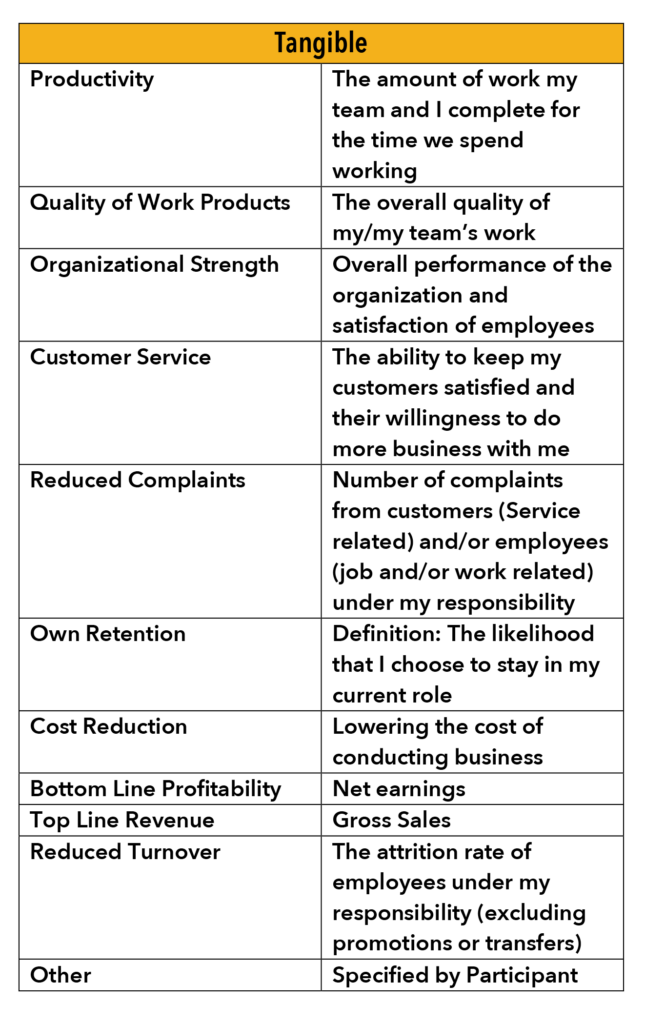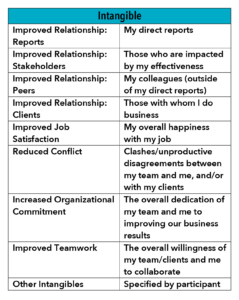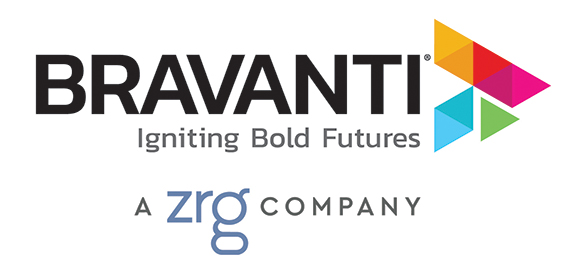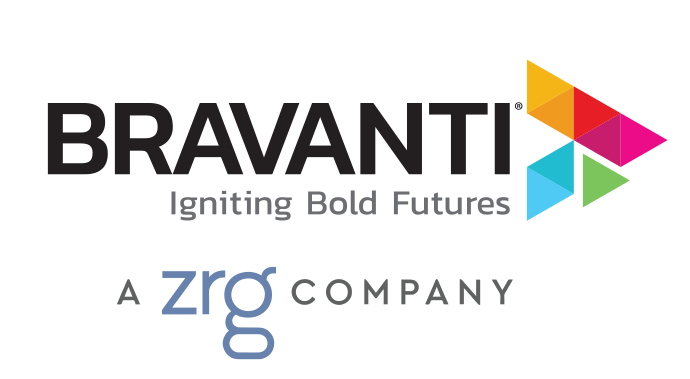Prior to the early 2000’s, studies analyzing impact and return of executive coaching were few and far between. With the turn of the century, and the growth in popularity of executive coaching, the demand for research analyzing the efficacy of executive coaching has grown considerably. Many of these studies sought to define executive coaching, identify the various methodologies used, and to understand what value it provides to individuals, teams, and organizations.
Today, leading studies search for—and continuously find—evidence that executive coaching is a key tool for leadership development, executive alignment, performance improvement, and more.
Since our inception, Bravanti has coached thousands of business leaders globally from a wide range of industries, including healthcare, financial services, CPG, real estate, hospitality, and more. We’ve witnessed the course-altering impact of one-on-one and group coaching in terms of tangible and intangible business impact, with both immediate and long-term effects.
We consistently receive positive feedback about how our coaching has helped leaders and their organizations succeed, with measurable returns on investment and powerful impact to the bottom line.
Simply put, executive coaching works.
We recently conducted an in-depth study on our clients’ experiences and impacts of executive coaching. The results support the growing body of research that proves executive coaching is a highly effective resource in taking individual, team, and organizational performance to new heights.
About the Executive Coaching Study
In 2021, Bravanti examined a global cross-section of 100 of the thousands of senior executives we coached between 2015 and 2020, in organizations ranging from privately owned to middle-market to well-known Fortune 500 and FTSE 100 organizations.
Our clients are typically high-performing executives seeking to improve their leadership capabilities for greater impact on their organizations, teams, and people, as well as a bottom-line impact for shareholders and stakeholders.
At the beginning of an executive coaching engagement, the leader is asked to discuss with their coach and set realistic and specific goals for three of the most important business impacts they want to focus on. These business impacts are reviewed weekly or bi-weekly to assist in maintaining focus and accountability. As the engagement progresses, these goals often evolve and change, and new goals may emerge. This is all documented as part of the end-of-program analysis.
Our analysis for this executive coaching study measured 10 tangible and 8 intangible impact areas (as defined below) with those coached over the time period, recording high, medium, and low impacts experienced as a result of executive coaching, the goals set by each leader, and the business impacts achieved, with dollar amounts assigned where appropriate.


Study Results & Findings
Our executive coaching study revealed many insights. Some of these findings were expected while others were quite surprising. Keep reading for a synopsis of our findings and download the full report for a detailed account of the study, participants, and the results.
100% of Participants Reported Powerful ROI
Of the 100 study participants coached between 2015 and 2020, 100% reported significant financial benefits from their coaching engagements.
In fact, with an average investment for a coaching engagement of $25,000, and an average return of $2.1 million, study participants realized an average return of nearly 84 times the original investment.
One such example is that of a large healthcare subsidiary. The CEO had experienced great success with his own executive coaching and sought to extend the benefits of coaching to his executive team. The goal was to support the company’s leaders in adapting to change while developing healthier team dynamics.
The approach focused on self-awareness, effective communication, improved partnership and collaboration, and refocusing strategic goals at all levels, among other things. Through one-on-one and group coaching, the company realized a $14.2 million return on investment, $7 million cost reallocation, and a 90% success rating on the goal of improving team dynamics.
Improved Relationships and Teamwork Account for Top 4 Impact Areas
Executive Coaching can positively impact many areas of one’s professional life. These areas are commonly considered to include executive presence, improved decision making, and stronger strategic direction. While these impacts certainly emerged in our study, interestingly, the top four impact areas revealed were all relational, with improved relationships and teamwork accounting for the top four business impacts across all study participants. These were followed by organizational strength, productivity, and increased organizational commitment.
Highest average impacts as reported by participants (based on their individual goals):
- Improved relationships with stakeholders – 70%
- Improved relationships with direct reports – 68%
- Improved teamwork – 67%
- Improved relationships with peers – 62%
- Organizational strength – 58%
- Productivity – 49%
- Increased organizational commitment – 43%
While this further proves the positive impact that executive coaching has on professional relationships and team dynamics, it also demonstrates a direct correlation between intangible impact areas and tangible ROI.
“Coaching impacted the quality of collaboration, decision making and commitment to results within the team. It reduced unnecessary conflict by giving us a framework to communicate and work out issues we are facing.”
Value $5M
Own Retention
When we think of retention, we usually think in terms of someone else’s retention, rather than our own. However, it’s important to know what drives your decision to stay in your own position. We found that, after some reflection, many of our study’s participants credited their executive coaching experience with their own retention and were able to place an ROI value on the savings or revenue opportunities that were created.
“I feel more energized and less stressed because I came to realize that I have to develop others and trust them to lead the business. I also needed to be more explicit in coaching them to think differently about their businesses. I am now able to focus on new sources of growth for the company, including a very large multi-million-dollar opportunity.”
Value: $2M
Achieving & Sustaining New Behaviors & Approaches
Modifying longstanding behaviors is not an easy task. It requires objectivity, self-awareness, intentionality, and accountability.
Many of the study participants noted their success in changing desired behaviors, and throughout the data collected, these leaders commented on their growing awareness of how their behavior impacted others. This awareness helped them to focus on improving communication, working collaboratively, and working to improve relationships.
“I am listening more, delegating more – letting go and giving myself and others space to demonstrate their skills, which also empowers others to be better and develop more.”
The Direct Impact of Coaching on Others
Coaching is often seen as an individual-focused experience, but a crucial outcome of the coaching process is the impact on others.
Throughout the study, participants regularly identified improvements in their workplace culture as a result of the coaching engagements. The more effective leadership resulted in improved communication, better relationships, and as a result, improved corporate outcomes.
More and more companies are beginning to understand the positive impact of cascading the principles and processes of coaching throughout an organization, rather than limiting it to the C-suite or boardroom.
“The coaching has given increased accountability for the whole team to perform and allows each individual to better understand what the organization really needs from them.”
Moving Courageously Forward with Executive Coaching
This study recorded the powerful impact of executive coaching at the individual, team, and organizational levels.
But we know that executive coaching is not a “one-and-done” formula. All the leaders we coach recognize their own responsibility for sustaining coaching results, and they continue to commit themselves to this effort. Leadership is a lifelong journey of learning.
As the future unfolds and leaders continue to face the most complex workplace issues on record, executive coaching will continue to be of great value to leaders as they tap into their own potential to move courageously forward.
Download the full report for additional findings, case study examples, and first-hand insights from study participants.
Click here to learn more about our individual and team Executive Coaching services.
About Mary Herrmann
Mary is Managing Director of the Global Executive Coaching practice at Bravanti, leading an extensive team of professional coaches in the U.S. and abroad. Mary and her team are focused on helping organizations drive change and deliver results through proven best practices in leadership and executive team development. Read more >
About Bravanti’s Executive Coaching Solutions
Bravanti’s Executive Coaching practice equips leaders and teams with the competencies and skills needed for courageous leadership. Through a best-practice methodology and a global cadre of highly credentialed executive coaches, Bravanti helps leaders tap int their own potential to align their goals, vision, and values; take action to remove barriers and change behaviors; and foster collaboration and accountability for high-level performance, delivering a measurable ROI to both the individual and the organization. For more information on our Executive Coaching services, contact us at info@bravanti.com.
Content Related to Impact & Return: Summary Overview of the Bravanti Executive Coaching Study
Executive Coaching Study: Impact & Return
Journeys in Leadership: Executive Coaching Video Series
Infographic: What is Coaching Worth? One Company’s Next-Gen Leaders and How They Arrived
Coaching: Never More Accessible – or Essential – than Now

